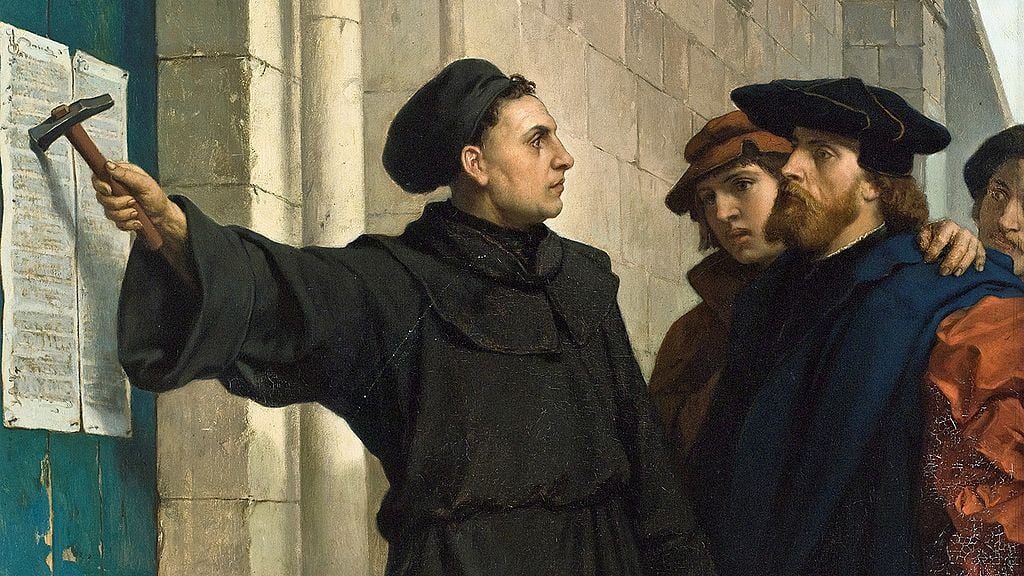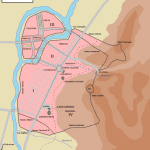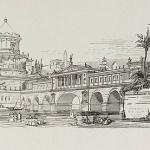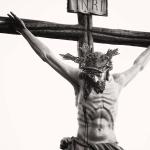
I remember the first time I learned about Martin Luther. My dad came home after a night class at the Berkeley seminary and started talking about his church history class. He said something about this guy, Martin Luther, he had learned about, and I was so sure that he had made a mistake. Junior, right? I said. My second grade teacher had taught us what Martin Luther King Jr meant; it meant that his dad’s name was Martin Luther King Senior.
It took my dad a few seconds to figure out what I was talking about. No, he said, this is a different one. Have you ever heard of the Ninety-Five Theses? I was seven, so no.
The next time my dad took me to Fremont Public Library, I decided to fix this. I went to the search computer – the DOS system was so much more high tech than the card catalogue (which my second-grade teacher had taught our class to use) – and typed in Ninety-Five Theses. No luck. Same went for Martin Luther. Nothing recognizable. Then, because I knew what my dad was studying, I tried theology. With that I hit the jackpot, a bazillion hits. Too much, I thought. Maybe let’s try divinity. Fewer, but nothing about the theses.
Of course, I didn’t want to read all ninety-five of the theses. Before getting into the Berkeley seminary, my dad had done another theology degree at a Pentecostal school where he had to write a thesis. It was long, like over a hundred pages, and it had chapters, like a chapter book of the Boxcar Children variety that the third graders read. He was working on it when we took an epic road trip through Nevada, the Temple Square in Salt Lake City, the Grand Tetons and Yellowstone, Helena up in Montana, Calgary, and then across the Rockies to Vancouver where I had been born seven years before. In Vancouver – or, actually, Richmond, where my parents had lived when it was still a lily white suburb (it didn’t start being an ethnoburb till the nineties) – my godmother had loaded our minivan up with board games so that it looked through the window of the hatchback that the games would make the car explode. That night, after dinner in Vancouver, we found that our car had been broken into. The board games were all still there, but our luggage was all gone. So was the thesis. Dad had to start all over.
A thesis, I surmised, was a lot of work, and it didn’t help that one of Dad’s friends, a non-Christian who hung out with a lot of Christians, sarcastically said on the spot, I guess God is telling you that that first draft is not good enough. Uncle Eddie, it should be noted, has never been praised for his social skills.
Dad had so much trouble with one thesis that I couldn’t imagine Martin Luther writing ninety-five of them. It wasn’t until a few years later when the Scholastic Book Club that sent around catalogues to our elementary school classes featured a series of books like How to Get Straight A’s in School. Somewhere in that book series – or maybe it was later on in Ron Fry’s How to Study series – I learned about a thesis statement. This was intriguing. Wasn’t a thesis supposed to be hundreds of pages long? What’s all this about the one sentence that your essay is about?
Maybe Luther had ninety-five essays, then. That made sense. By the time I was reading from the Scholastic catalogues, Dad had started talking about how it seemed I was more interested in reading fiction than essays. I was nine, so yes. Besides, the girl I was told I liked (except, ew, cooties) was reading Narnia, and she let me borrow some of them, which meant that I didn’t have to order them from Scholastic.
This was all before we had Internet, and when we did get Internet (AOL, with a dial-up modem), I was so lost in my other obsessions – Warcraft II and Canadian Brass – that I never thought to look up Luther and his ninety-five theses.
Somehow, maybe through some World History class either in sixth grade (which meant that it would have been in class) or seventh grade (which meant that it would have been in a class – big difference), I learned that Luther had nailed those theses to a church door in Wittenberg. It struck me that even ninety five theses would have been too thick for that. It dawned on me then that maybe they were just ninety-five sentences. How disappointing.
I never read the Ninety-Five Theses; you don’t have to if you’re Protestant. All you have to know at some point is that the Ninety-Five Theses were what made us Protestant because Protestant means that we are protesting the Pope and his Catholic Church. And there was a lot to protest. My Catholic friends, for example (the Pentecostal school I was at was very open minded and took a lot of them in), had to go to catechism class and learn about Tobit (which is not in the Bible) and someday get confirmed because they had been baptized as babies before they even knew what was going on. When I finally did go to Catholic school for high school, it was even worse: there were lots of smart people, to be sure, but they all turned into theological zombies when I talked to them about faith. The church says…the church says…the church says…how about reading the Bible for yourself and arriving at your own conclusion as a thinking person?
I survived Catholic school with my Protestantism intact, or so I thought. There were a few close calls. For example, I started a literary magazine with a Holy Cross priest who talked about how creative writing is an act of creation that transfigures the world we are describing. Little did I know that he was feeding me Balthasar, and when I finally did get around to reading Balthasar, I was shocked (shocked, I tell you!) to find treatments of Luther in The Glory of the Lord. The magazine was called Sea Changes, and I believe it is still going strong to this day. Of course, my friends all joked that it should be called Tse Changes and that I was their fearless leader, and at the club fair, we all gathered around each other and called each other comrades and blasted the Soviet national anthem. For me, the coincidence of the 500th anniversary of the Reformation and the 100th anniversary of the Revolution is personal.
The problem when you attack Catholics for not thinking about their faith is that you expect, by contrast, that all Protestants are thoughtful people. This was, I discovered, not the case when I moved to Vancouver. Of course, I should have known this growing up in Protestant churches my whole life, but the difference is that when I moved to Vancouver, I was not going to Catholic school anymore and so didn’t have any more Catholics to attack. In name, the church – where my dad pastored for a year before all four pastors resigned in rapid succession and my dad himself gloriously flamed out in a heart attack (he survived it) – was a free church, one of those Scandinavian churches that felt that Lutheranism had not divested itself of enough state authority and therefore had to break completely free of even a kind of state Protestantism. In practice, though, the practice of Chinese free churches in North America usually has something to do with divesting themselves of previous church experiences with an authoritarian senior leader, so they rewrite the bylaws to make the pastors the employees of the deacon board (and deacons in that tradition are not ordained; they are what Catholics, Orthodox, and magisterial Protestants call the parish council). Theoretically, this was supposed to be more democratic; practically, it meant that all the people sounded like Catholics when they said, the deacons say…the deacons say…the deacons say…
The Reformational mythology of Luther nailing his ninety-five theses to the church door in Wittenberg was strong, and I was tempted to nail my own to this church’s doors, especially when I saw what they were doing to my dad. I never ended up doing it, and I’m glad I didn’t because the doors were glass, so I would have been cited for vandalism (I had toyed with the idea of using tape, but it wasn’t as romantic). But what I did start searching for was a real Protestantism, a people who really read the Bible and think like Luther told them to instead of repeating what the church or the deacons say.
And that is how I found Mark Driscoll.
It happened in a Christian outlet store at the SuperMall in Renton. Vancouver people are notorious for driving down through Bellingham, then Seattle, then the Seattle suburbs to get good deals, and the least boring store that I know of at the SuperMall (I hate shopping) is the Christian outlet. I was eighteen, first year in university, and browsing through the tub of on-sale books that they had when I found this orange book titled The Radical Reformission. It was like 60% off, so I bought it.
When I began reading it, it looked legit: Driscoll used the word postmodernism, and so did my professors. Driscoll talked about H. Richard Niebuhr, and my dad had read Christ and Culture at the Berkeley seminary. Driscoll talked about The Church Between Gospel and Culture (the Hunsberger/van Gelder volume), and I had just bought that at the local Chinese evangelical bookstore in Richmond (the Vancouver ethnoburb) because it looked like the most academic thing in the store. Also, it cited Niebuhr and this Lesslie Newbigin guy (I gathered it was a guy). Driscoll also cited Newbigin.
The Reformission, as far as I understood it, was supposed to be this mission to the secular city – in Driscoll’s words, ‘teach the Bible, lead men, plant a church, marry Grace.’ It was, as far as I could tell, a neat idea. Cities were centres of culture, they needed Jesus, put a church there, change the culture. I later heard about this other guy Tim Keller who kinda looked like a Buddhist monk and said similar things too.
This was around 2004. New Calvinism, if you must know, was not a thing; in fact, Driscoll preached a sermon around the time – I remember this because it was one of the newest uploads to the Mars Hill Church website – on how to read the Bible where he made fun of Calvinists and then said, Let me show you my theological underwear. I’m Calvinist. The associations we draw now among Driscoll, Keller, John Piper, D.A. Carson, and so on were just not there; the ‘Gospel Coalition’ didn’t exist, neither did the Resurgence, and it would be two years before Collin Hansen wrote ‘Young, Restless, Reformed‘ for Christianity Today. I came across each of these guys independently, mostly by milking the sales sections of Christian book stores, and read them, and here, I thought, were Protestants who think. I was eighteen. I was in my first year of university. I was going to a free church of lemmings. This felt different. I was on fire when I read John Piper adjust the Westminster Catechism so that we glorify God by enjoying him forever. What a clever man.
I also finally read the Ninety-Five Theses, and through taking church history and medieval history classes in college, I learned about how Luther had protested the selling of indulgences from some used car salesman called Jon Tetzel who said that as soon as a coin in the coffer rings, a soul from hell springs. I concluded that Catholics and Protestants have similar problems: when your church needs to fundraise for a building project (like St Peter’s Basilica), you might start selling coupons to bail your relatives out of hell, and that is how all this the church says, the deacons say comes about. As Ms Lauryn Hill says, It’s funny how money change a situation…
If you were on the Mars Hill website at the time, they had a small network of churches called Acts 29. Nowadays it’s not so small, but at that time, the only other Acts 29 church seemed to be another church called Harambee Church started by Driscoll’s co-planter Mike Gunn. On Harambee’s site, there was a reading list for training elders. Sure enough, John Piper was on that list, but so were Marva Dawn and Eugene Peterson (basically contemplative mainline Protestants easily mistaken for liberals, if only evangelicals wouldn’t read them so much, especially Peterson’s translation of the Bible, the Message). In one section of the list was a section on the Reformation. There were a few books on Luther – Roland Bainton’s Here I Stand, Heiko Oberman’s Luther: Man Between God and Devil, Alister McGrath’s Luther’s Theology of the Cross.
Bainton got pretty boring, so I never finished him, but Oberman and McGrath were a doozy. I didn’t understand all the philosophical stuff about nominalism and voluntarism (I didn’t even understand that in my first-year medieval Europe class, and I got an A in that class), but I got the sense that they were saying that Luther didn’t appear out of nowhere, and that late medieval Catholicism was not really this massive Ponzi scheme that necessitated Luther writing those ninety-five theses, but was a set of ideas with many moving parts and many players arranged in many factions. This made disturbing sense of some of the parts of the Ninety-Five Theses where I thought Luther was way too nice to the Catholics. He’d say that the Pope would never go along with the indulgences thing, and that the Church would never go against the Bible, and that the true Gospel as everyone knows is about repentance, and I just thought he was so naïve. But if what Oberman and McGrath were saying was true, then there is also a little problem: it means that Luther was engaging Catholic theology and that even his ideas were born out of some Catholic intellectual tradition. This was troubling.
Slowly, my criticism of Catholics became more muted. It was all a big misunderstanding, I reasoned; maybe Luther was Catholic after all, and who would know that better than the Catholics? The more I learned, the more I found this was probably true, and by the time I flamed out of ministry myself (long story – but it took me off my New Calvinist path to ordination in the Anglican realignment), I was rebuilding my faith in conversation with other thinking evangelicals by reading Balthasar and de Lubac.
The problem is that I was still only talking to other Protestants about Catholics. The thing that most Catholics do not understand about Protestantism is that there is indeed a faction that bridges mainline and evangelical Protestantism where the Catholic Church could simply do no wrong because they are the founders of monastic spirituality and contemplative practices (don’t tell the Orthodox) and what Robert Webber called ‘ancient-future worship,’ and these were the waters in which I swum. It was a rude awakening while on retreat at the Holy Cross creative writing priest’s house that I said something about Luther over the dinner table, and another priest who was an expert on Flannery O’Connor says, I don’t engage with heretics. It was awkward until he said, Just kidding, man, and the table broke out into laughter, but the joke gave the lie: Luther is persona non grata within the Catholic Church. So much for it being a big misunderstanding.
Now I am Eastern Catholic. This means I am invested in conversations about Orthodoxy and deny that I have any interest in the Latin Church, which of course means that I am lying about that. Bring up Luther to the Orthodox, of course, and you will be wearing your teeth around your neck. But there is a reason for this: it is that the figure of Luther has cropped up again after Vatican II, with folks like Cardinal Walter Kasper championing Catholic-Lutheran relations and other guys like then-Cardinal Ratzinger trying to figure out the kinks in that relationship (see Principles of Catholic Theology, which is written as – shall we say – a fraternal correction to Kasper – Ratzinger’s diagnosis is that the big meaningful difference between Protestants and the Latin Church is apostolic succession). With such ecumenical gestures – and with the very public friendship of Kasper and Pope Francis – it seems to me that there is some great excitement from my Protestant friends about all things Bergoglio and some serious misgivings and outright hostility among the Latin rad trads and the Orthodox for the Vatican fraternizing with the enemy, as it were.
I am no Luther scholar, although the colleague who used to teach in the classroom I used to teach in here at Northwestern, Christine Helmer, is. Helmer, as far as I know, tells people to read Luther critically, to not take what he says full-on (especially not his anti-semitic bits, oh god), but to really try to understand the guy on politics, Catholic theology, and so on and then engage it with the realities of the twenty-first century. Perhaps all the hostility that is being played out on the ecumenical stage about Luther is because there is a lot of Luther says…Luther says…Luther says…
Helmer is right: this is not how to read Luther. Luther matters not because he is god, or an ecclesial authority (definitely not mine), or even that he is funny (‘When I fart in Wittenberg, the Pope of Rome wrinkles his nose,’ he writes). Instead, it is because our contemporary realities are still shaped by Luther, as is evidenced by our current ecumenical tussling. When the ecumene fights, the earth we inhabit is drawn in. Let us read Luther with critical eyes, then, because Luther concerns all of us. Perhaps then we might decide where we stand before we can do no other. So help us, God.
















